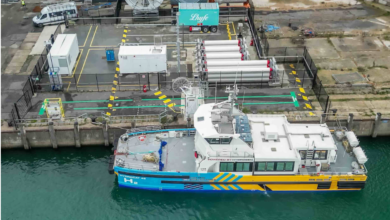Shell to test hydrogen power vessel in Singapore
Hydrogen and fuel cell technology have a substantial potential to decarbonise the marine and energy industry

A consortium that includes the oil giant Shell will work on a feasibility study to trial the use of hydrogen fuel cells for ships in Singapore, H2 Bulletin reports.
Besides Shell, the consortium includes SembCorp Marine Ltd and its wholly-owned subsidiary LMG Marin AS, who will design the fuel cell and retrofit the vessel. Another partner, Penguin International will provide its roll-on/roll-off (RoRo) vessel, which ships goods on lorries between the mainland and Shell’s Pulau Bukom production site.
The project aims to develop and install an auxiliary power unit Proton Exchange Membrane (PEM) fuel cell on the ship. The partners will conduct the feasibility study to install the fuel cell in the vessel by 2022, then running it for a twelve-month trial period. If successful, it would help pave the way for a cleaner, hydrogen-powered shipping.
Nick Potter, GM of Shell Shipping and Maritime, Asia Pacific & Middle East, said, “This trial is an important step in demonstrating the applicability of hydrogen and fuel cells on ships.”
Wong Weng Sun, President and CEO of Sembcorp Marine, said, “Hydrogen fuel cells have the potential to revolutionise shipping and transportation.”
James Tham, MD of Penguin, said, “This trial is significant for Singapore and for the maritime community at large.”
Shell set a goal to become a net-zero carbon company by 2050. It also joined a consortium to develop an LNG fuel cell trial on a commercial deep-sea vessel.
